I've made a few marmalade recipes over the years. So far this Calamondin Orange Marmalade is one of my favorites.
It's neck and neck between the Calamondin Orange Marmalade and the Meyer Lemon Marmalade I made last year.
Last year I spotted this cute little orange plant growing in a hanging basket at Lowes. I was intrigued by this little orange tree. I had never heard of a calamondin orange before. So I, of course, bought one.
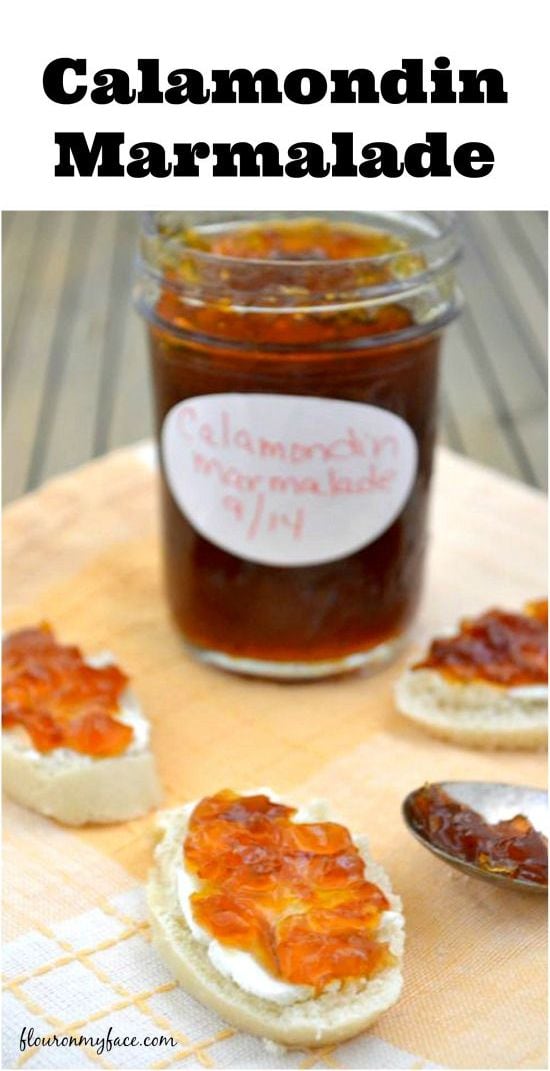
After I got home from Lowes I hit the internet running so I could find out all about these tiny little citrus gems called calamondin oranges.
What I found out was that they are so tender that the only way you can get your hands on them is pretty much to grow a calamondin tree yourself.
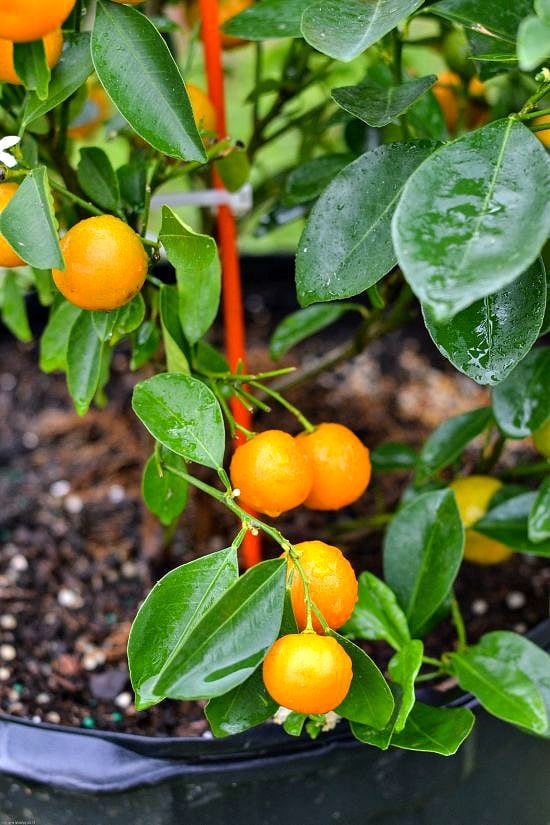
Growing a Calamondin Orange Tree
Have no fear though you can grow one yourself and if you don't live in Florida like I do or another warm climate state you can grow one in a container and bring it indoors during the winter months.
When the calamondin tree is in bloom your house will fill with the scent of orange flowers.
Right now my tree is in full bloom and when the wind blows just right and I am sitting on my lanai I can smell that sweet scent.
From what I read they are very easy to grow (here in Florida they bloom all year long) and if you plant one tree in the ground the seeds from the fruit that fall to the ground will sprout and before you know it you will have a calamondin grove growing.
I only have my one tree growing in a large pot right now but I may try growing a few more trees from seeds so I can share the calamondin love.
Calamondin Marmalade
If you just want to buy some calamondin marmalade or baked goods you can head over to the Calamondin Cafe.
They have a full line of products made with calamondin oranges.
They have a grove of calamondin oranges, make all their products by hand and are gmo-free, nut free and toxin free.
I also found them while I was researching the calamondin orange. You know what's funny? The Calamondin Cafe is a local business right here in my backyard.
They sell at some of our local farmer's markets so I had a chance to sample their calamondin marmalade when I saw their booth at my favorite farmers market.
If you're in the Southwest Florida area during the winter months be sure to check them out at the Lakes Park Farmers Market.
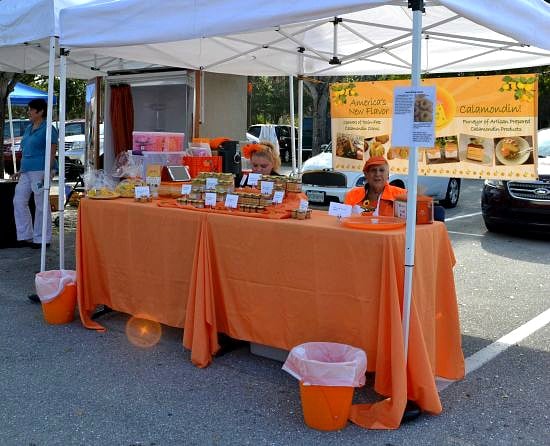
The Calamondin Cafe at the Lakes Park Farmers Market 2014-2015 season
How to make Calamondin Orange Marmalade
Canning marmalade is a bit different from canning other jams or jellies because the way you need to measure the ingredients is different to balance the unique texture and flavor of the peel that is used. Here's why:
Fruit and Peel: Marmalade uses whole citrus fruits, including the peel, which needs to be sliced thinly. The peel adds flavor and texture, so measuring it carefully ensures the right balance in the final product.
Water: Unlike most jams, marmalade requires adding water because citrus fruits are firmer and need extra liquid to soften during cooking. The amount of water is usually measured by volume (e.g., one cup of water per cup of fruit).
Sugar Ratio: The sugar is typically measured by the weight of the fruit, not by volume. This ensures the marmalade sets properly, as the sugar interacts with the natural pectin in the citrus to create the gel-like consistency.
Marmalade measurements focus more on the weight (for the sugar) and volume for the water because the combination of fruit, peel, and added water must balance perfectly for the right texture and flavor. This makes it a bit more precise than other jams or jellies.
Ingredients
The amount of calamondin oranges I am starting with is what I had on hand. Marmalade can be made with any amount of citrus fruit (but I wouldn't use less than 1 cup) because the important key is measuring the water and sugar correctly to match the amount of fruit you have started with.
By sticking to these measurements, you can make marmalade with any amount of citrus, whether you have a few fruits or a whole basketful!
- I'm using about 40 fresh calamondin sour oranges
- the juice and peel from the calamondin oranges
- equal amounts of water
- equal amounts of sugar
- 1 tablespoon butter
Simple Steps to Homemade Calamondin Marmalade
Making marmalade with calamondin oranges involves a few basic measurement steps to ensure the right balance of fruit, sugar, and liquid for the perfect consistency. Here's a general guideline:
Directions
Step 1: Slice and Seed: Squeeze the juice into a bowl and cut the calamondins peels into thin slices, removing and discarding the seeds.
Step 2: Measure the Fruit: Measure the sliced fruit and juice by volume (e.g., in cups). Note this volume for the water ratio.
Step 3: Add Water: For every cup of sliced calamondins and juice, add one cup of water. This step ensures the fruit cooks evenly and releases its natural pectin. (Example 1 ½ cups juice and peel means you will add 1 ½ cup water.)
Step 4: Measure the Sugar: Measure the sugar to equal the amount of fruit, peel and water (e.g., 1 ½ cups fruit, peel and water = 1 ½ cups of sugar). Less sugar may result in a thin set so do not try to make this recipe with less sugar.
Step 5: Cook the Mixture: Combine the fruit, water, and sugar in a large heavy bottomed pot. Make sure not to over fill the pot. The pot should only be about half way full to prevent boil overs. Heat on low to begin with, stirring occasionally so the sugar doesn't scorch on the bottom of the pot. Once the sugar has dissolved bring to a rolling boil, then reduce heat to a soft boil until the mixture reaches 220°F (104°C) on a candy thermometer, which is the setting point for marmalade.
Checking for a proper set
Test for Set: Place a saucer in the freezer before you begin. Use the "plate test". Check set by dropping a dollop of marmalade on the cold plate and push the edge with your fingertip. If marmalade wrinkles it has reached the proper set.
Hot Water Bath
- Follow all basic water bath canning safety measures for this recipe.
- Fill the jars to a ¼ inch head space. Wipe the rims with a damp paper towel. Place a flat lid on the jar and screw a band on finger tip tight.
- Process the marmalade in a hot water bath 20 minutes.
- Cool for 24 hours before cleaning the outside of the jars and storing.
- Label and date all jars.
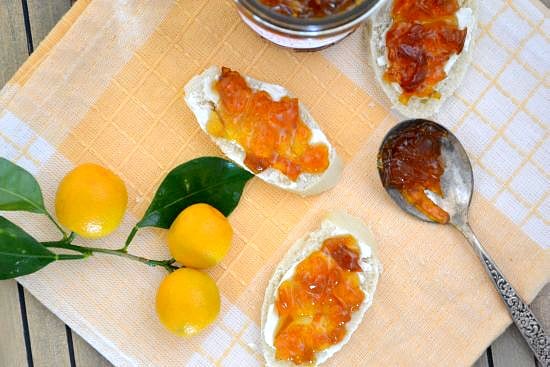
Tips
- Flattening each calamondin in half makes it very easy to thinly slice the peel into ribbons.
- Adding a tablespoon of butter to pot will help cut down on the foaming.
- Do not attempt to taste test the marmalade set right after making this marmalade recipe. Citrus based canning recipes like marmalade can take up to a month to set up properly. Hot, warm or freshly made marmalade will be thin right out of the canner. Place a jar in the refrigerator for 48 hours then see how thick it is.
- Proper set: If you properly measured the ingredients and cooked the marmalade to the proper gel setting temperature the marmalade will set up properly. Marmalade is not like other fruit jams and jellies.
The calamondin orange is a sour orange that is also perfect to make a Cuban mojo marinade.
Print the Calamondin Marmalade Recipe below.
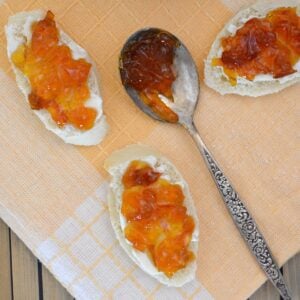
Calamondin Orange Marmalade
Ingredients
- 40 small fresh calamondin sour oranges
- equal amounts of sugar
- ¾ cup juice of the calamondin oranges (about ¾ cup)
- 1 ¼ cup water
- 1 tablespoon butter
Instructions
- Slice and Seed: Squeeze the juice into a bowl and cut the calamondins peels into thin slices, removing and discarding the seeds. Flatten each calamondin in half and thinly slice the peel into ribbons.
- Measure the Fruit: Measure the sliced peel and juice by volume (e.g., in cups). Pour into the pot. Note this volume for the water ratio.
- Add Water: For every cup of sliced calamondins peel and juice you have, add one cup of water. This step ensures the fruit cooks evenly and releases its natural pectin. (Example 1 ½ cups juice and peel means you will add 1 ½ cup water.) Add to the canning pot.
- Measure the Sugar: Measure the sugar to equal the amount of fruit, peel and water (e.g., 1 ½ cups fruit, peel and water = 1 ½ cups of sugar). Less sugar may result in a thin set so do not try to make this recipe with less sugar. Add the sugar to the pot.
- Add butter to pot.
- Cook the Mixture: You will have combined the fruit, water, and sugar in a large heavy bottomed pot. Make sure not to over fill the pot. The pot should only be about half way full to prevent boil overs. Heat on low to begin with, stirring occasionally so the sugar doesn't scorch on the bottom of the pot. Once the sugar has dissolved bring to a rolling boil, then reduce heat to a low boil until the mixture reaches 220°F (104°C) on a candy thermometer, which is the setting point for marmalade.
- Test for Set: Place a saucer in the freezer before you begin. Use the "plate test". Check set by dropping a dollop of marmalade on the cold plate and push the edge with your fingertip. If marmalade wrinkles it has reached the proper set.
- If the marmalade has not reach a proper set continue to cook checking for the set point every 10 minutes or so until reached.
Hot Water Bath
- Fill half pint canning jars with the marmalade, wipe the rims and place the flat lid on. Twist a metal band on the jar. just until finger tip tight. Repeat until all jars are filled.
- Process marmalade in a hot water bath for 20 minutes. Uncover the pot and turn off the heat. Wait 5 minutes before removing the jars from the canning pot. Place the hot jars on a towel to cool.
- Cool for 24 hours. Check to make sure all the jars have sealed before removing the metal bands and washing the jars off.
- Makes about 5 half-pint jars.
- Store the jars of marmalade in a cool dark cabinet.
Recipe Expert Tips
- Check the marmalade setting point: Place a glass saucer in the freezer while you are cooking the marmalade. To check to see if the marmalade has reach the marmalade setting point drop a small dollop of marmalade on the cold saucer. Allow the marmalade a couple of minutes to cool down. Use a finger tip to push the edge of the marmalade with your fingertip. If you can see the marmalade wrinkle it has reach the marmalade setting point.
- Adding a tablespoon of butter to pot will help cut down on the foaming.
- Do not attempt to taste test the marmalade for a proper set right after making this marmalade recipe. Citrus based canning recipes like marmalade can take up to a month to set up properly. Hot, warm or freshly made marmalade will be thin right out of the canner. Place a jar in the refrigerator for 48 hours then see how thick it is.
- Proper set: If you properly measured the ingredients and cooked the marmalade to the proper gel setting temperature the marmalade will set up properly. Marmalade is not like other fruit jams and jellies.


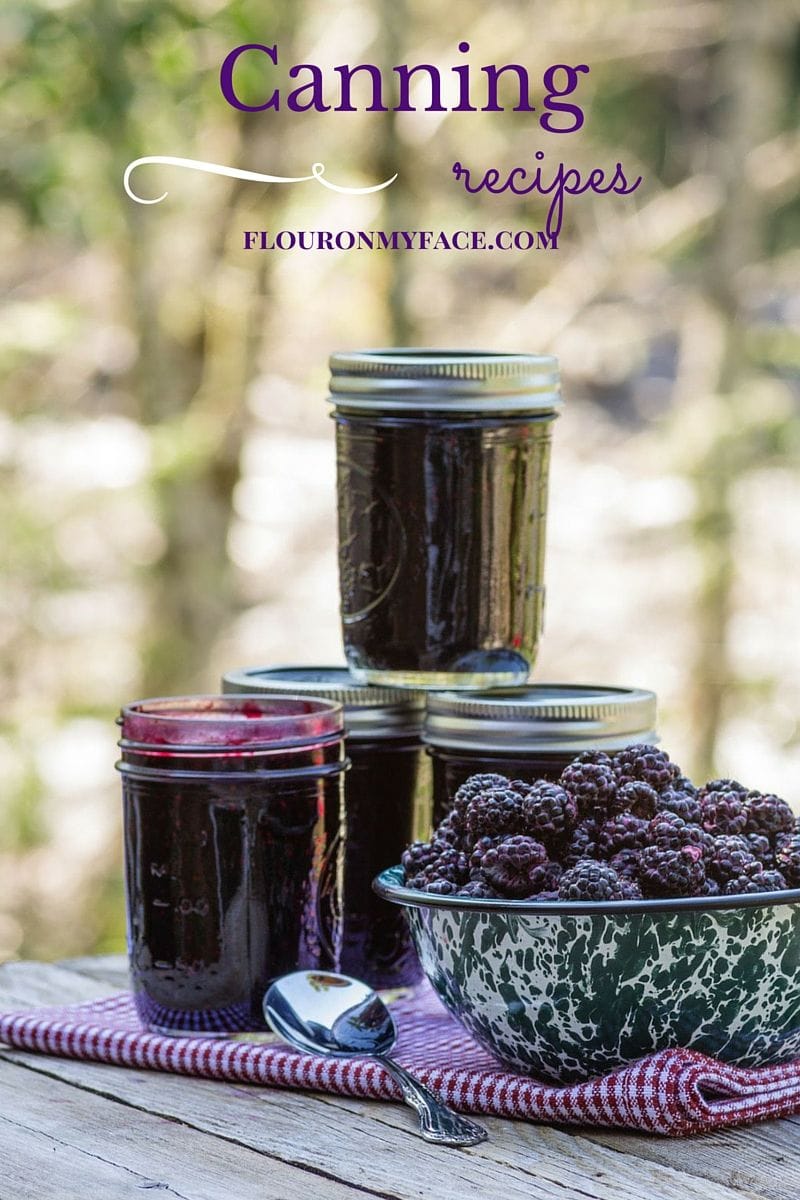
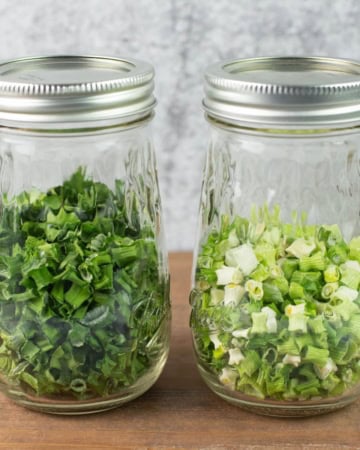
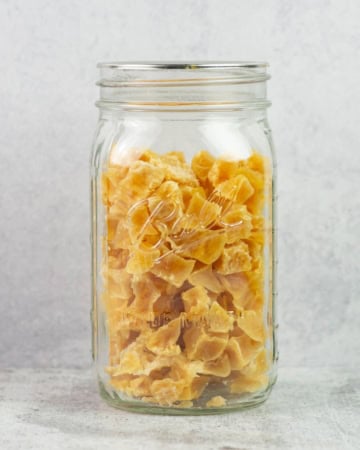
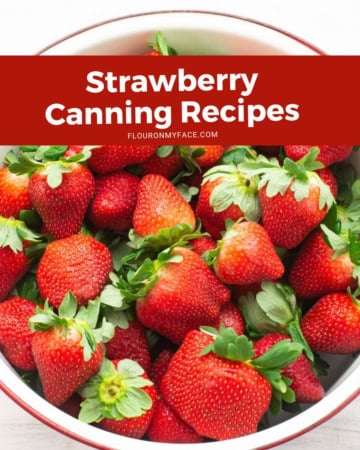
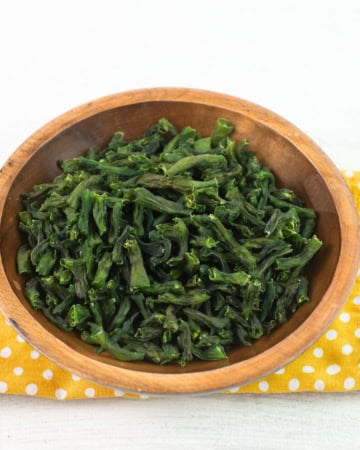
David M
I've been making this for a few years now. I have a prolific California tree and I get 2-3 substantial harvests a year. A few tips I've learned making this marmalade. I use all fruit chopped and de-seeded, tiny ones are pitted and used halved for little bursts. I measure on a scale, add equal weight water, de-seed again, and blend about half with a hand blender. Wait and watch as seeds missed will float for way removal of strays. The add same amount of sugar as water in weight. Mine never gets to 220 but near if I push it to 220 it goes very dark. For me, at 217-218 I boil until it gets gloopy (scientific term :). Always on a seed hunt while boiling. Sets up very nicely though never reaching 220. If I push it to 220 it can turn into cement. I started with this recipe and now I've dialled it in for a nice golden orange Marmalade everyone asks for. It's always a winner and perfect for Christmas gifts.
Arlene Mobley
David thank you for sharing your tips!